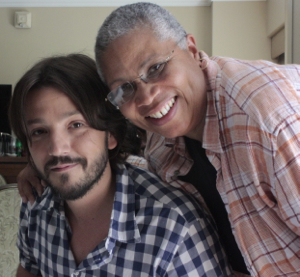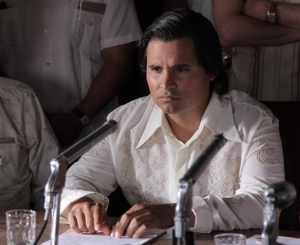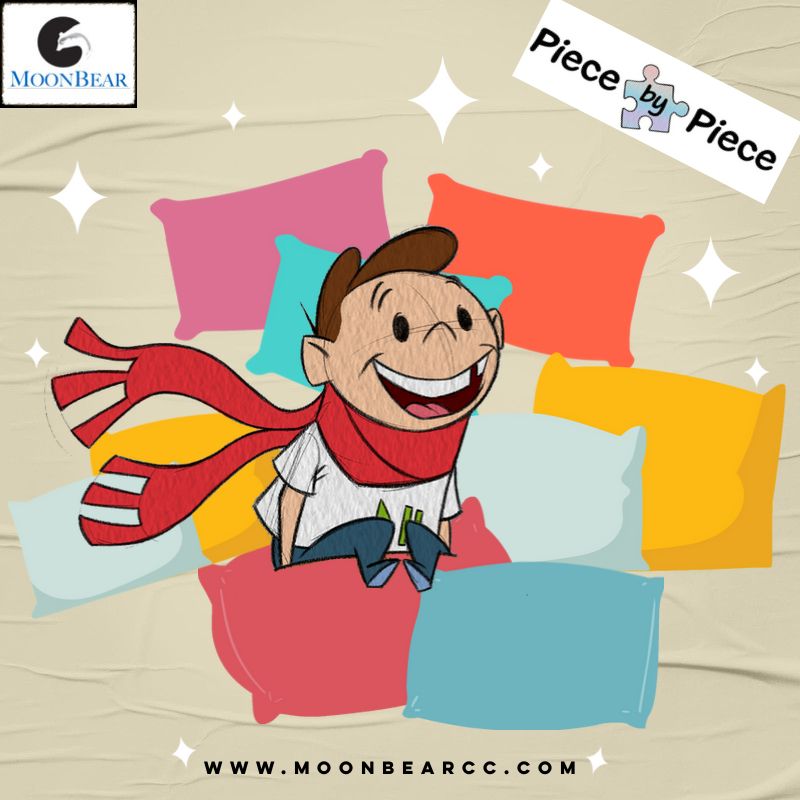Se Fija!’s Angela Ortíz spoke to the award-winning actor about the August’s sci-fi blockbuster, his work on Chavez and why he does what he does so well.
Elysium is already out in a few theaters, and opens wide Friday August 9 for what looks to be a very promising first weekend. Among its many virtues–including powerful performances by Matt Damon and Jodie Foster, who is very good at being very bad–you’ll see a wide range of Latino actors–more Latinos in one science fiction blockbuster than you’ll find in all the other summer hits (and misses) combined, including Alice Braga, who plays Damon’s childhood love, Wagner Moura, Yolanda Abbud L., Jose Pablo Cantillo…and Diego Luna. Luna is an accomplished hyphenate in Hollywood–a writer-producer-director–who’s worked on everything from horror movies (Vampires: Los Muertos) to musicals (Dirty Dancing: Havana Nights) to big dramas for major directors (The Terminal) to serious independent films (Milk). His last two titles alone indicate the range of his work: you saw him most recently in the Mark Walberg crime thriller Contraband and Will Ferrell’s ridiculous send-up of telenovelas, Casa de mi Padre. Elysium is very different than either of those: a science fiction/action adventure with deep sociological roots and a real message, from the writer/director of the equally impressive District 9. In it, Luna plays the best friend of Matt Damon–a key part of the poverty-stricken earthbound population of Los Angeles in 2154, in conflict with an orbiting space station reserved only for the elite.
Se Fija! Publisher Angela Ortíz had a chance to sit down with Luna and talk about his work on Elysium, his upcoming producer-director project Chavez, as well as why he does what he does and what he enjoys doing most.
Luna admits he got the role for Elysium in an unusual way: he was offered the part without an audition, even though he does believe auditioning is still very important. “It’s your first connection with the actor/director relationship,” he said. “For me, as an actor and director is very essential.”
Elysium is set a hundred-forty plus years in the future, and like the world that writer-director Neil Blomkamp postulated in District 9, it is not a happy place for everyone. The future Los Angeles looks more like a devastated post-apocalyptic landscape than a thriving city of tomorrow–a city where everyone is poor, and–it seems–everyone speaks Spanish. But even though there seem to be no Latinos in the heavenly city of Elysium, where all the rich people live, he didn’t see Blomkamp’s world as essentially race-based. Matt Damon’s character–who is also from L.A.–wasn’t Latino, he pointed out. Instead, he sees the film as a battle between “the haves and the have nots. You are watching a film based in 2154, but like a boomerang, it reflects our life today. It is more than just being Latino. It is universal.”
Se Fija’s friends over at Desde Hollywood asked Luna if he was now more willing to be part of a big-budget sci-fi or superhero movie.
“Yes,” Luna said. “As an actor, I want to face different challenges to learn and stay curious. I don’t want to feel that I have arrived to the place I wanted to be. As a director, I don’t know. Those processes take three or four years of your life. But as an actor: of course. If one day they call me, I would do X-Men or whatever. I don’t care; the idea is amusing to me.”
“This idea is a great opportunity,” he said. “It has pure entertainment, and if you go to the movies to see androids and humans fighting with strange futuristic weapons and spaceships, this is the movie you have to see. But if you also like the kind of films that challenge you and confront you with who you really are, this one is also that.”
“Over the years,” Angela asked him, “You’ve made all kinds of movies–dramas, historical epics, political pictures, even horror movies and action pictures. Do you approach each of these differently? Do you have any preference?”
“As an actor, my preference would be the kind of films I grew up watching:
dramas, I would say, and comedy. Since I realized the amazing
feeling of making people laugh…”
“That’s difficult,” he said. “As an actor, my preference would be the kind of films I grew up watching: dramas, I would say, and comedy. Since I realized the amazing feeling of making people laugh, I’m always trying to find that opportunity again.”
This is Diego Luna’s first science fiction film, and he found that exciting as well. “It’s like walking into a park,” he said, “and finding cool toys and amazing people and crazy shit, basically.” But in large-scale films like this–and for Luna, in films in general–there is always feeling that “I was not in control.”
“I guess if it’s about acting,” he said after some thought, “I’d rather do theater, because theater is a place where the actor is in control. You’re there, and it’s an experience that happens between you and the audience. Versus cinema, where you’re a tool for some else’s point of view; you don’t know what film you’re doing ‘til you watch the film, you’re just a part, a tiny bit of the process.”
Luna found himself drawn to the entire process–which is why he began producing and directing almost ten years ago. “I realized how exciting the whole process is, and how much a schizophrenic journey the actors lead; you arrive and it’s so intense, but in three months you’re back home, and the film won’t be ready for a year or two. So I prefer theater.”
So the future–as an actor, producer and director–looks both busy and bright for Diego Luna. He’s just finished working on as producer-director on Chavez, his film about Cesar Chavez, where he’s contracted with a Mexican production team. “The production quality you get in Mexico now is so vast; they are very impressive and very professional. And not only because U.S. film companies are coming to film there, it’s because Mexico is producing more than 60 films per year.” We will see the film in theaters soon, and Luna says he’s happy with the result. In fact, every time he sees it, he says, he likes it more and more. “It can be difficult, when you work on a project has long as I have on this one, to maybe not enjoy it anymore, but not in this case. I think we have a good film, I am very proud of everyone involved in it.”
The exact premiere date for Chavez is still up in the air. “I’m taking my time,” he says, “not rushing the final finish, since we’ve invested so much work on it. We are finalizing the sound, the visual effects. In about one or two months it will be ready. Then comes the next important process: the campaign to get the film out and let the public know the film exist. It’s a very important film for the U.S. because of its storyline of non-violence and how we get our food. It’s important to strategize well and get it to the public, so we can talk about and think of how things get to our table and maybe change our habits.”
And what comes next, after Chavez, is entirely up to Diego Luna, and he’s in no hurry to answer that question. “I do less,” he admits, “to be close to my children, to the people I love. Once I thought I could be everywhere, but I realized you have to learn to prioritize and the company you keep or who is part of your life.”
Elysium opens wide (if it hasn’t already) at a theater near you. Here is the slightly awesome trailer:












